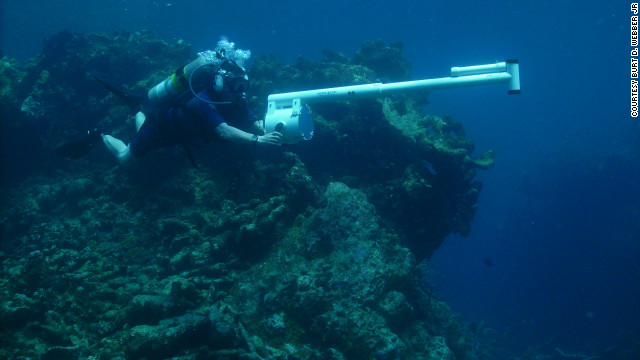Why scouring sea for sunken treasures is big business -- Deep sea treasure hunters may evoke storybook images of swashbuckling buccaneers on daring ocean adventures.
For those in the rapidly expanding sector of marine archeology however, scouring the depths of the sea for sunken riches is business -- big business.
"There are multi-hundreds of billions of dollars of potential in this industry," says Sean Tucker, founder and managing member of Galleon Ventures, a U.S. based historical shipwreck and salvage exploration company.

Today's treasure hunters operate in a billion dollar industry using the latest hi-tech tools, says Sean Tucker of U.S. based historical shipwreck company, Galleon Ventures
"Treasure bearing ships that have historical artifacts, coins, emeralds" dating back hundreds of years are lying at the bottom of the sea just waiting to be brought to the surface, he adds.
UNESCO estimates there to be as many as three million shipwrecks scattered across the bottom of the world's oceans.
There are multi-hundreds of billions of dollars of potential in this industry
Sean Tucker, Galleon Ventures
Although Tucker points out that only 3,000 of these are likely to bear treasure of any value, discoveries such as the $3 billion of platinum located on a World War II merchant vessel by American salvage company, Sub Sea Research, last month confirm the industry's potential.
The possibility to reap such bountiful rewards has inevitably led to increased industry investment in recent years, says Tucker.
Hedge funds, private equity firms as well as cash rich individual investors have all been eager to provide the capital to back increasingly specialized treasure ventures.
As a result, the biggest salvage companies are now able to utilize the same advanced tools used by big oil firms to locate deep sea drilling opportunities, explains Tucker.
The most expensive exploration projects, which are almost always in a deep sea environment, can cost in the region of $30 million dollars to undertake, he adds.
High tech developments are a logical progression for a sector where the rewards for success are so high. But Tucker also points out that the potential to make vast profits has led some companies to explore wrecks that modern day governments still claim ownership over without permission.
While most salvage companies seek the cooperation of the relevant authorities before commencing their operations, Tucker says there are a significant number of "amateurs doing it under the radar getting what they can get."
Concerns about the methods of some of those operating in the marine archeology industry are also noted by Lucy Blue from the Centre of Maritime Archaeology at the UK's University of Southampton.
When you dig a hole in the ocean you are effectively destroying the archaeological evidence
Lucy Blue, University of Southampton
She says that some projects plunder sunken wrecks with little concern for their archaeological composition and academic value, leading to the desecration of important underwater sites.
"When you dig a hole in the ocean you are effectively destroying the archaeological evidence. If you don't do that in a systematic way you are destroying important knowledge of past maritime activities," says Blue.
Not only is this frustrating from an academic perspective, she adds, but it also ensures that important monuments to maritime history are kept locked away in the hands of private collectors.
"You have to question ultimately what is happening with what is found. Are the artifacts held in a collection that people can benefit and learn from or are they being distributed and sold for the profit of a few," says Blue.
But while she is quick to acknowledge that not all salvage operations are inconsiderate to archaeological posterity, Blue also states that it is important for governments to sign up to the UNESCO Underwater Cultural Heritage Convention to guarantee high standards for all underwater treasure operations.
Tucker also agrees and believes it will be of more value to salvage companies in the long term to cooperate with international bodies and to work to the highest ethical and archaeological standards.
Given the considerations of shareholders and private investors, he says, "there's nothing worse than taking your investors money and then having a government tell you can't keep the treasure you've found," he says.
Tucker highlights an agreement between Florida based shipwreck exploration company, Odyssey Marine, and the British government to locate the wreck of 17th century ship the HMS Sussex as an example of how private businesses and sovereign countries can cooperate to their own mutual benefit.
He also cites his own company's work with the government of Colombia -- where along with partner company Seaquest International,Galleon are negotiating a "host country contract" to explore various underwater wrecks, divide the profits of any treasure recovered as well as providing items of significant historical importance to national museums and galleries -- as a responsible and productive way to conduct the business of marine archeology.
If governments, academics and private businesses can work together in a similar way, he adds, then the potential of this billion dollar industry can be shared by all. ( cnn.com )
Blog : Live Old Memories
No comments:
Post a Comment